Order-3-5 heptagonal honeycomb
In the geometry of hyperbolic 3-space, the order-3-5 heptagonal honeycomb a regular space-filling tessellation (or honeycomb). Each infinite cell consists of a heptagonal tiling whose vertices lie on a 2-hypercycle, each of which has a limiting circle on the ideal sphere.
| Order-3-5 heptagonal honeycomb | |
|---|---|
| Type | Regular honeycomb |
| Schläfli symbol | {7,3,5} |
| Coxeter diagram | |
| Cells | {7,3} 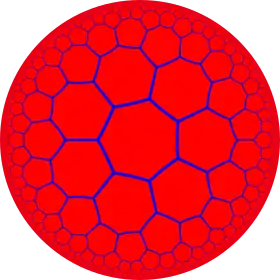 |
| Faces | Heptagon {7} |
| Vertex figure | icosahedron {3,5} |
| Dual | {5,3,7} |
| Coxeter group | [7,3,5] |
| Properties | Regular |
Geometry
The Schläfli symbol of the order-3-5 heptagonal honeycomb is {7,3,5}, with five heptagonal tilings meeting at each edge. The vertex figure of this honeycomb is an icosahedron, {3,5}.
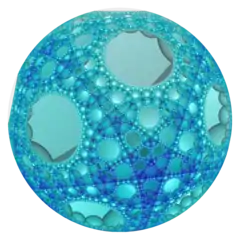 Poincaré disk model (vertex centered) |
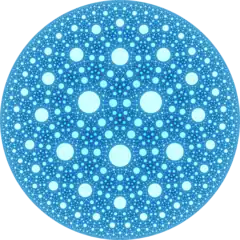 Ideal surface |
Related polytopes and honeycombs
It is a part of a series of regular polytopes and honeycombs with {p,3,5} Schläfli symbol, and icosahedral vertex figures.
| {p,3,5} polytopes | |||||||
|---|---|---|---|---|---|---|---|
| Space | S3 | H3 | |||||
| Form | Finite | Compact | Paracompact | Noncompact | |||
| Name | {3,3,5} |
{4,3,5} |
{5,3,5} |
{6,3,5} |
{7,3,5} |
{8,3,5} |
... {∞,3,5} |
| Image |  |
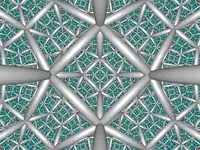 |
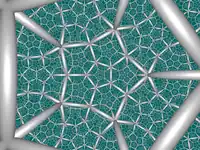 |
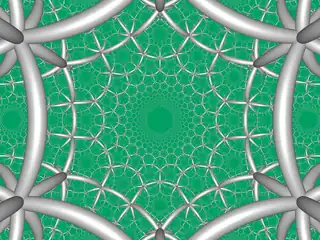 |
 |
 |
 |
| Cells | {3,3} |
{4,3} |
{5,3} |
{6,3} |
{7,3} |
{8,3} |
{∞,3} |
Order-3-5 octagonal honeycomb
| Order-3-5 octagonal honeycomb | |
|---|---|
| Type | Regular honeycomb |
| Schläfli symbol | {8,3,5} |
| Coxeter diagram | |
| Cells | {8,3} 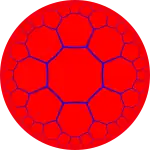 |
| Faces | Octagon {8} |
| Vertex figure | icosahedron {3,5} |
| Dual | {5,3,8} |
| Coxeter group | [8,3,5] |
| Properties | Regular |
In the geometry of hyperbolic 3-space, the order-3-5 octagonal honeycomb a regular space-filling tessellation (or honeycomb). Each infinite cell consists of an octagonal tiling whose vertices lie on a 2-hypercycle, each of which has a limiting circle on the ideal sphere.
The Schläfli symbol of the order 3-5 heptagonal honeycomb is {8,3,5}, with five octagonal tilings meeting at each edge. The vertex figure of this honeycomb is an icosahedron, {3,5}.
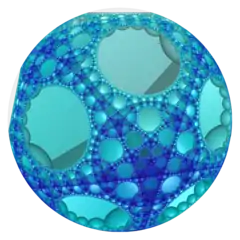 Poincaré disk model (vertex centered) |
Order-3-5 apeirogonal honeycomb
| Order-3-5 apeirogonal honeycomb | |
|---|---|
| Type | Regular honeycomb |
| Schläfli symbol | {∞,3,5} |
| Coxeter diagram | |
| Cells | {∞,3} 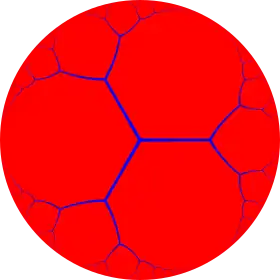 |
| Faces | Apeirogon {∞} |
| Vertex figure | icosahedron {3,5} |
| Dual | {5,3,∞} |
| Coxeter group | [∞,3,5] |
| Properties | Regular |
In the geometry of hyperbolic 3-space, the order-3-5 apeirogonal honeycomb a regular space-filling tessellation (or honeycomb). Each infinite cell consists of an order-3 apeirogonal tiling whose vertices lie on a 2-hypercycle, each of which has a limiting circle on the ideal sphere.
The Schläfli symbol of the order-3-5 apeirogonal honeycomb is {∞,3,5}, with five order-3 apeirogonal tilings meeting at each edge. The vertex figure of this honeycomb is an icosahedron, {3,5}.
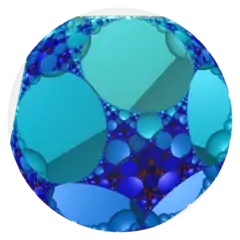 Poincaré disk model (vertex centered) |
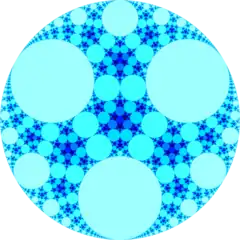 Ideal surface |
References
- Coxeter, Regular Polytopes, 3rd. ed., Dover Publications, 1973. ISBN 0-486-61480-8. (Tables I and II: Regular polytopes and honeycombs, pp. 294–296)
- The Beauty of Geometry: Twelve Essays (1999), Dover Publications, LCCN 99-35678, ISBN 0-486-40919-8 (Chapter 10, Regular Honeycombs in Hyperbolic Space) Table III
- Jeffrey R. Weeks The Shape of Space, 2nd edition ISBN 0-8247-0709-5 (Chapters 16–17: Geometries on Three-manifolds I,II)
- George Maxwell, Sphere Packings and Hyperbolic Reflection Groups, JOURNAL OF ALGEBRA 79,78-97 (1982)
- Hao Chen, Jean-Philippe Labbé, Lorentzian Coxeter groups and Boyd-Maxwell ball packings, (2013)
- Visualizing Hyperbolic Honeycombs arXiv:1511.02851 Roice Nelson, Henry Segerman (2015)
External links
- John Baez, Visual insights: {7,3,3} Honeycomb (2014/08/01) {7,3,3} Honeycomb Meets Plane at Infinity (2014/08/14)
- Danny Calegari, Kleinian, a tool for visualizing Kleinian groups, Geometry and the Imagination 4 March 2014.